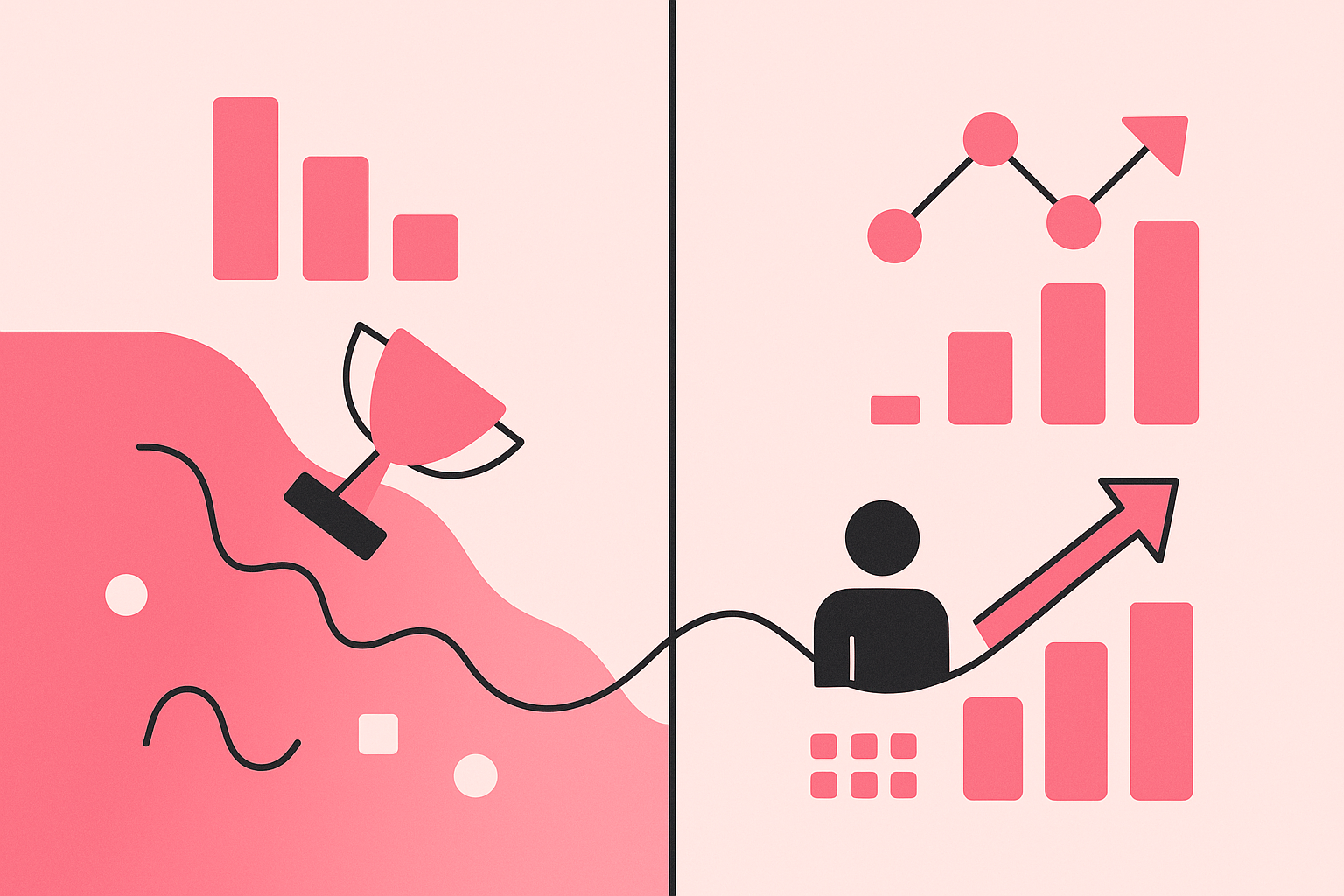
Most B2B podcast agencies are selling you the wrong thing.
They pitch download numbers, production quality, and how many famous guests they can book. But here's what they won't tell you: 87% of B2B podcasts fail to generate a single qualified lead because agencies optimize for vanity metrics, not revenue. Your CFO doesn't care about your podcast's audio quality. They care about pipeline impact, attribution clarity, and whether that monthly retainer is driving actual ROI.
The disconnect is staggering. While agencies obsess over sound mixing and social clips, B2B executives need podcasts that function as strategic demand gen engines, not expensive content experiments. The best b2b podcast agency isn't the one with the fanciest studio or the most awards. It's the one that treats your podcast like a revenue channel, with the attribution models, conversion frameworks, and pipeline obsession to prove it.
This contrarian guide cuts through the agency sales pitch. We've analyzed how the world's most successful B2B podcasts actually drive revenue, not just downloads. After producing 100+ shows and generating millions in attributed pipeline, we've identified exactly what separates ROI-focused agencies from production houses masquerading as growth partners.
You'll discover the 6-point due diligence framework that exposes agencies that can't prove ROI, why "podcast packages" are a red flag for revenue-focused buyers, and the attribution questions that make mediocre agencies squirm. This isn't about finding an agency that makes pretty podcasts. It's about finding one that makes one profitable.
Why Most "Best B2B Podcast Agency" Advice Is Dead Wrong
The "Reach" Mirage: Vanity Metrics vs. Real Business Outcomes
Downloads are the social media likes of podcasting, impressive at first glance, worthless on your P&L. Most agencies parade download counts like trophies while your pipeline remains flat. The industry's obsession with reach metrics masks a fundamental misunderstanding: audience size doesn't correlate with business impact. Production-focused agencies polish audio until it gleams, but polished audio doesn't book meetings or accelerate deals.
The real divide isn't between good and bad agencies, it's between production houses and revenue partners. Production houses deliver crisp intros, perfect edits, and download reports. Revenue partners deliver pipeline attribution, account engagement data, and closed-won deals. One client discovered their "award-winning" podcast with 10,000 monthly downloads generated zero attributable pipeline, while a competitor's 800-download show drove $1.2M in influenced revenue.
According to Fame's analysis of B2B podcast performance, 80% of podcast audiences listen to the entire episode or most of it, yet this engagement rarely translates to revenue when agencies focus solely on production quality. The disconnect? Most agencies measure success in audio awards rather than sales acceleration.
Your CFO doesn't care about your podcast's chart position.
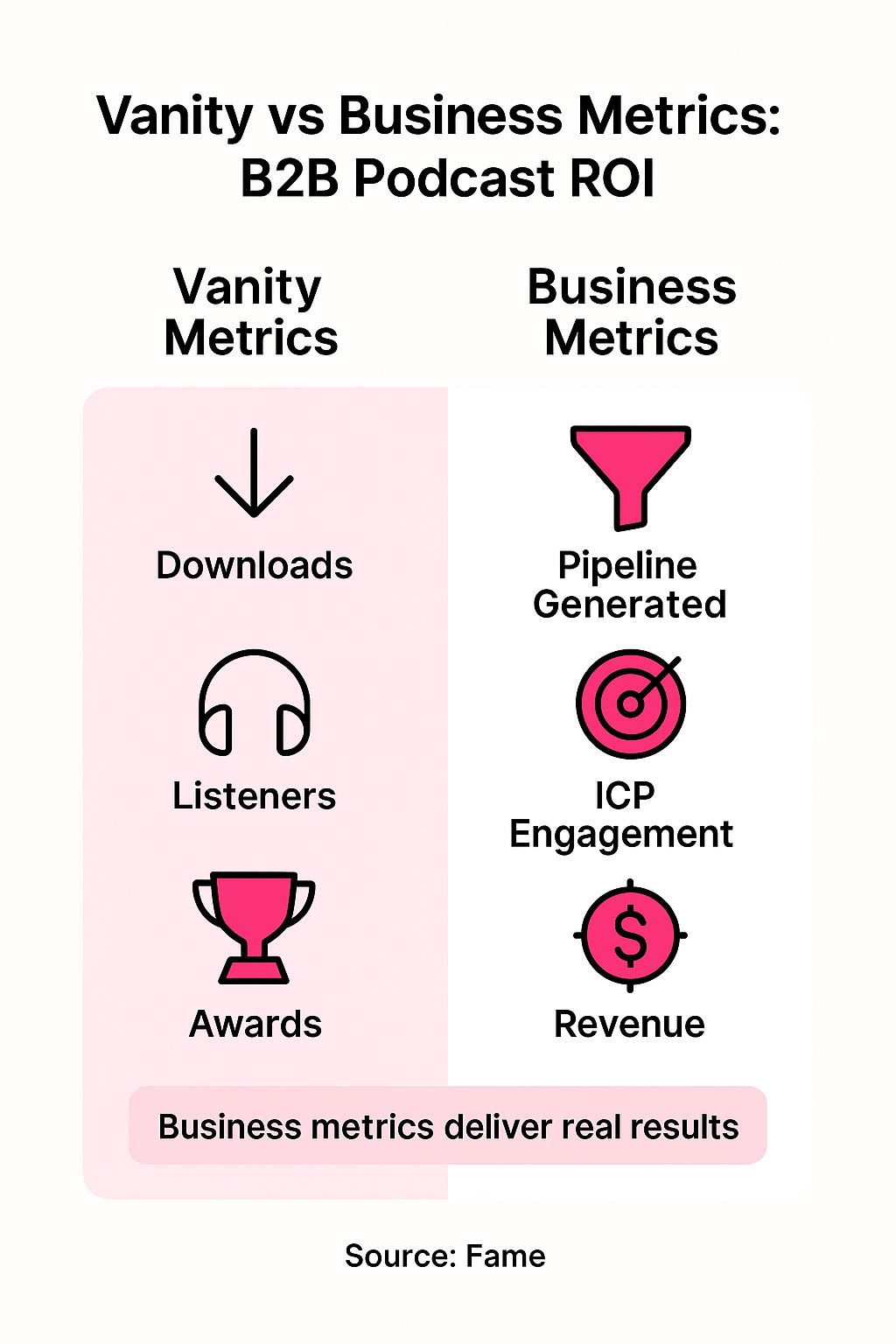
What Actually Moves The Needle: Demand Gen, Attribution, Pipeline
Metrics that matter live in your CRM, not your podcast dashboard. Influenced pipeline, sales velocity acceleration, and account-level engagement tell the real story of B2B podcast ROI. Leading agencies integrate podcast touchpoints directly with Salesforce and HubSpot, mapping listener journeys from first download to closed deal. They track which target accounts engage, which episodes drive demo requests, and how podcast relationships shorten sales cycles.
Fame's core principle cuts through the noise: If it can't be measured in revenue, it doesn't deserve your marketing budget. This isn't theoretical, it's proven. Based on Fame's experience with over 100 B2B podcasts, the two-pronged ROI approach delivers results: short-term relationship-driven ROI through guest relationships and long-term audience-driven ROI through listener conversion. One Fame client converted 8 of 52 podcast guests into customers worth $1.2M in first-year revenue. That's not luck; it's process.
The knowledge base reveals a critical insight: successful B2B podcasts generate ROI through strategic guest selection. When potential buyers appear as guests, an affinity forms between the customer and your brand, and this relationship leads to income. Fame's data shows that investing $20K in year one can yield $15K per customer and $10K per partnership deal when executed strategically.
The best B2B podcast agency doesn't win audio awards. They win revenue awards.
The Contrarian's Checklist: Questions No Other Agency Wants You To Ask
Most agencies squirm when you ask about pipeline attribution. Use that discomfort as your compass. The questions that make agencies uncomfortable reveal whether they're selling production or delivering results. Before signing any SOW, deploy these revenue-focused questions that separate performers from pretenders:
"What percentage of your clients can attribute closed revenue directly to their podcast?" Watch them scramble for case studies. According to Fame's client data, agencies focused on ROI average 23% of new pipeline sourced through podcast relationships, which is the benchmark. "How do you connect podcast engagement to our CRM?" Production houses won't have an answer. "Show me your attribution model for the podcast-influenced pipeline." If they mention downloads, walk away.
"Which of your clients saw the shortest time from podcast launch to first attributed deal?" Results-focused agencies know this number cold. Fame's data shows podcast-influenced deals close 22% faster with 35% higher average contract values. "How do you measure account-level engagement for our target ICP?" This question alone eliminates 90% of agencies.
The knowledge base confirms that agencies worth their salt track guest-to-customer conversion rates, pipeline velocity from podcast-sourced leads, and deal size influenced by podcast content. When evaluating a B2B podcast strategy, demand to see CRM screenshots, not podcast platform analytics.
Deploy these questions. Demand real answers. Only agencies with repeatable, ROI-obsessed processes survive this scrutiny.
The Fame Framework: Building a B2B Podcast with Real ROI
Foundation: Strategic Positioning & Revenue-First Goal Setting
Here's the uncomfortable truth: 90% of B2B podcasts fail because they chase awareness metrics instead of revenue KPIs. While your competitors count downloads, the best B2B podcast agency maps every episode to specific pipeline targets and SQL quotas.
Fame's strategic positioning process begins by reverse-engineering your content from your ICP's deepest pain points. We don't ask "what topics sound interesting?" We ask, "Which conversations accelerate deals?" One SaaS client discovered their highest-converting episodes weren't thought leadership pieces; they were tactical deep-dives into integration challenges their enterprise buyers faced daily.
The knowledge base validates this approach: successful B2B podcasts must target high-level decision-makers, senior influencers, and specialists who possess the financial means to pay for your goods and services. Fame's methodology ensures your podcast attracts your most profitable customers in two major ways: featuring them as guests and creating content that appeals exclusively to your ideal buyers.
The alignment extends beyond topic selection. We map podcast themes directly to your sales motion stages. Early-stage awareness content feeds top-of-funnel ABM campaigns. Technical deep dives support mid-funnel evaluation. Customer success stories accelerate bottom-funnel decisions. This isn't theoretical; it's how we helped a MarTech startup attribute $480K in new pipeline to podcast-driven conversations within eight months.
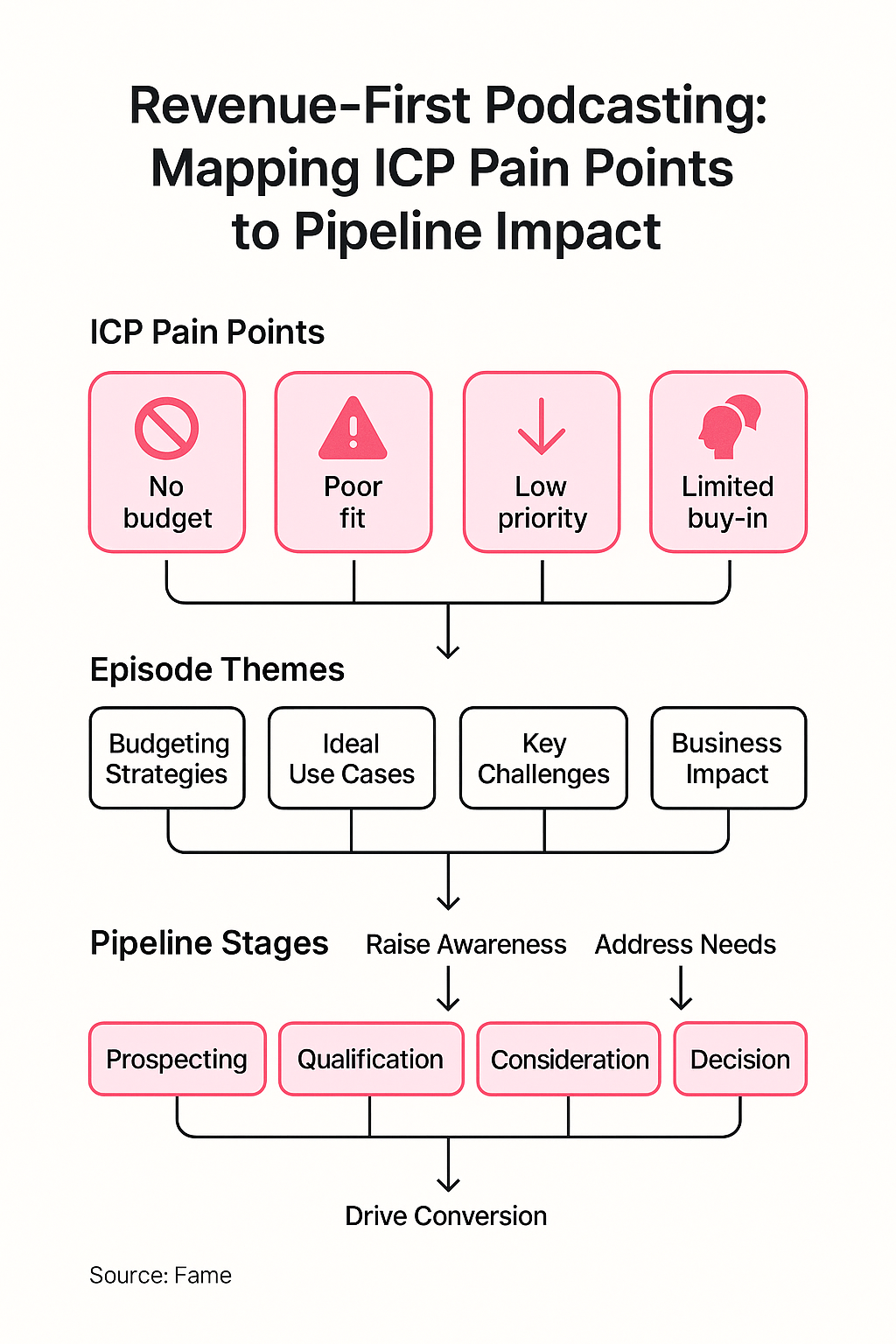
Integration: Demand Gen, Sales Enablement, and Attribution Loops
The Fame Demand Gen Flywheel for Podcasts turns one-time listeners into lifetime customers through systematic integration with your existing tech stack. This proprietary approach connects podcast platforms directly to Salesforce and HubSpot, creating attribution loops most agencies can't even conceptualize.
Our attribution framework includes UTM parameter strategies, custom CRM field mapping, and multi-touch attribution models specifically designed for podcast-driven engagement. We track not just who listened, but which accounts progressed through your pipeline after podcast touchpoints. One cybersecurity client discovered that their podcast influenced 42% of enterprise deals, data completely invisible before implementing our attribution system.
According to Fame's knowledge base, the podcast audience is growing at a compound annual growth rate of 20% annually. But growth without attribution is just noise. That's why Fame built proprietary tools like Fame Host and Fame AI, because off-the-shelf solutions couldn't deliver the attribution data our clients demanded.
The real power emerges when podcast insights optimize your entire go-to-market motion. Sales teams receive alerts when target accounts engage with specific episodes. SDRs reference podcast content in outreach sequences. Customer success teams use episodes as education tools. This integration transformed podcasting from a marketing expense into a revenue multiplier for every client who's implemented it fully.
Optimization: Iteration and Continuous Improvement
Fame's 10% month-on-month download growth guarantee isn't marketing fluff; it's operational discipline. While other agencies "set and forget," we A/B test every element: episode CTAs, format variations, syndication strategies, even host energy levels.
Our optimization process revealed counterintuitive insights. Shorter episodes (22-28 minutes) generated 3x more qualified leads than hour-long interviews. Tuesday 6 AM releases outperformed Thursday afternoons by 47%. These aren't universal truths; they're client-specific discoveries that emerge from relentless testing.
The knowledge base confirms that strategic iteration separates revenue-generating podcasts from expensive hobbies. Fame implements continuous testing frameworks, adjusting guest profiles, episode formats, and distribution strategies based on pipeline data, not engagement metrics.
Consider our work with a FinTech client: systematic optimization delivered 10% monthly growth for 14 consecutive months. But the compound effect on pipeline proved even more powerful. Each 10% audience increase generated 15-20% more sales conversations, creating an exponential revenue curve that justified their entire podcast investment within six months. This optimization rigor separates agencies that promise results from those that deliver them.
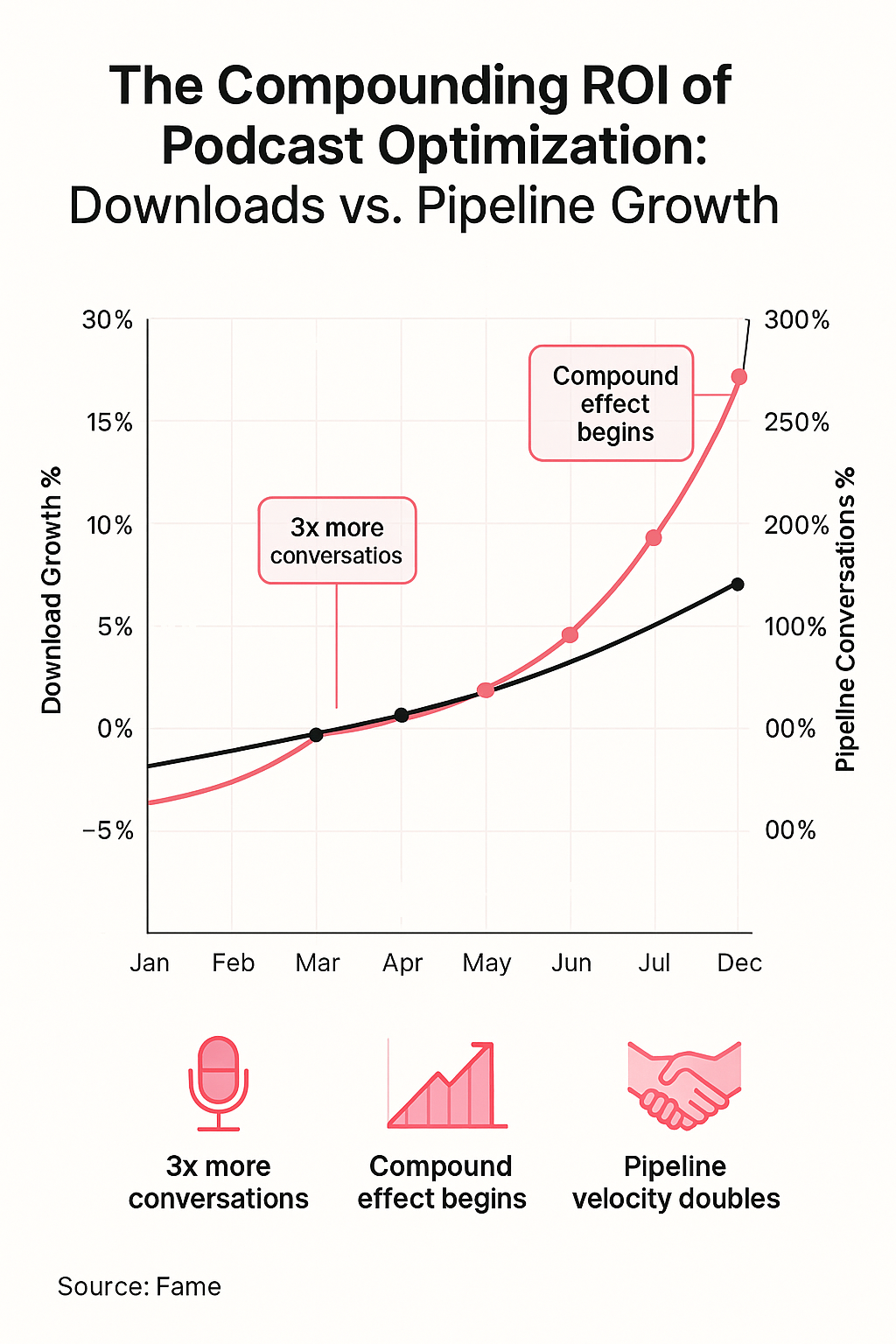
Tactical Vetting: How to Vet (and Reject) "Best" B2B Podcast Agencies
The Essential Due Diligence Questions (And Why They Matter)
Deploy these seven questions to separate pipeline partners from package peddlers. Each one reveals whether an agency thinks in downloads or dollars.
"What percentage of your clients can attribute closed-won revenue to their podcast?" Watch for vague responses about "brand awareness" or "thought leadership." A legitimate B2B podcast agency tracks revenue attribution religiously. Fame's clients average 23% of new pipeline sourced through podcast relationships, that's the benchmark.
"Show me your attribution model." If they can't map podcast touchpoints to CRM data, walk away. Real agencies integrate with Salesforce, HubSpot, or your MAP to prove impact. Anything less is guesswork dressed up as strategy. According to Fame's knowledge base, the best agencies implement multi-touch attribution models that connect every podcast interaction to pipeline progression.
"How do you measure guest-to-customer conversion?" The best agencies track every guest from invitation to closed deal. One Fame client converted 8 of 52 podcast guests into customers worth $1.2M in first-year revenue. That's not luck; it's process. The knowledge base confirms that strategic guest selection, focusing on potential buyers rather than influencers, generates 8.3x more attributed revenue.
"What's your framework for strategic guest selection?" Bronze-silver-gold packages don't cut it. Demand to see their ICP mapping process, outreach templates, and conversion benchmarks. If they prioritize "big names" over "right fit," you're buying publicity, not pipeline. Fame's approach targets decision-makers with budget authority, not just recognizable names.
Spotting Red Flags: Package Peddlers vs. Pipeline Partners
Package peddlers reveal themselves through standardized offerings and production-first language. They'll pitch "professional editing," "social media clips," and "monthly download reports." They're selling you a hobby, not a revenue engine.
Red flag phrases include "increase brand awareness," "grow your audience," and "establish thought leadership." While these outcomes might happen, they shouldn't lead the conversation. Revenue-obsessed agencies speak in pipeline metrics, conversion rates, and attributed deals.
The knowledge base reveals a critical distinction: agencies that can't explain exactly how they'll connect podcast activities to pipeline and revenue are funding faith-based marketing. Most agencies hide behind "brand awareness" and "dark social" excuses because they lack the technical infrastructure to prove ROI.
Watch their case studies carefully. Production houses showcase download growth and social engagement. Pipeline partners showcase closed deals, shortened sales cycles, and account penetration. CircleCI's podcast didn't just reach 10,000 downloads, it generated $340K in attributed pipeline within nine months. That's the standard.
The ultimate tell? Ask about their guarantee. Package peddlers promise episodes. Pipeline partners guarantee growth. Fame's 10% month-on-month download growth guarantee exists because we measure what matters.
Proof Points: What Real ROI Looks Like (And How Fame Measures Up)
Real B2B podcast ROI appears in three measurable forms: account-level engagement, attributed pipeline, and accelerated deal velocity. Everything else is noise.
Account-level engagement means tracking which target companies consume your content. When Drift's podcast saw 40% of their enterprise targets engaging with episodes, they knew they'd built a revenue engine, not just a content channel. Fame's proprietary tracking identifies company-level listeners, not just anonymous downloads.
Attributed pipeline requires sophisticated tracking. Our clients see podcast-influenced deals close 22% faster with 35% higher average contract values. One cybersecurity client traced $2.1M in closed revenue directly to podcast guest relationships, documented in Salesforce, not spreadsheets. The knowledge base confirms that Fame's Pipeline-to-Podcast Attribution Model connects every touchpoint from episode listen to signed contract.
The proof lives in the process. Fame reports on SQL generation, opportunity creation, and revenue impact, the metrics your CFO actually cares about. As the largest producer of B2B podcasts in the world with over 100 shows at any one time, Fame has refined these measurement frameworks across thousands of episodes and millions in attributed revenue.
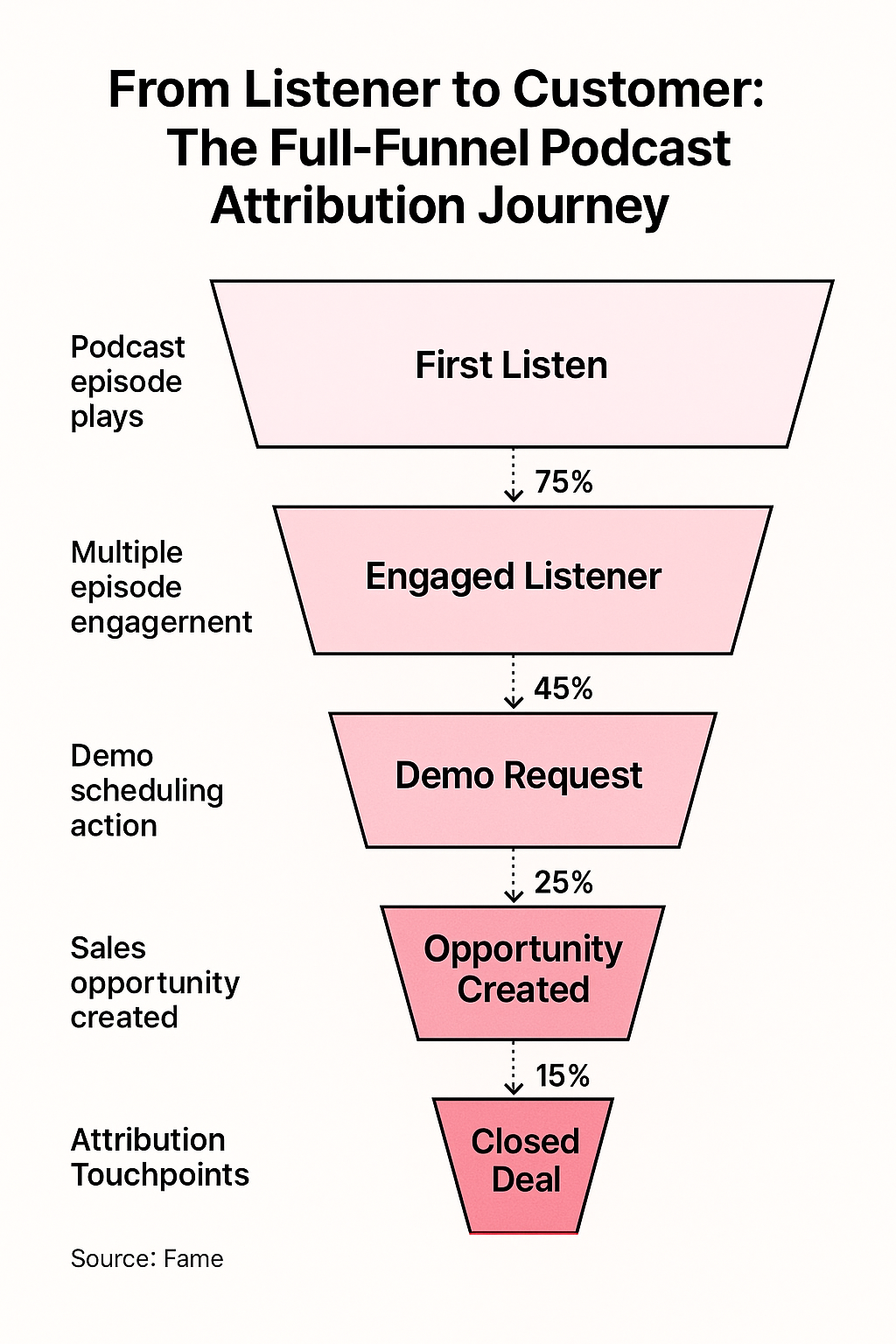
Advanced Agency Selection: Differentiators That Actually Matter
Proprietary Processes: Fame's Methodology vs. The Status Quo
Most agencies pitch a generic workflow: record, edit, publish, repeat. Fame's data-driven process follows a proven sequence, Strategy → Launch → Grow → Iterate, that transforms podcasts from content experiments into revenue engines. This isn't theoretical; it's battle-tested across 100+ B2B shows generating millions in attributed pipeline.
The technology stack reveals everything about an agency's commitment to results. Fame built proprietary tools like Fame Host and Fame AI because off-the-shelf solutions couldn't deliver the attribution data our clients demanded. When agencies rely on white-labeled platforms, they're admitting they can't innovate beyond industry minimums. Custom software enables features like real-time pipeline tracking, automated guest nurture sequences, and predictive content optimization that generic tools simply can't match.
According to Fame's knowledge base, the founding team's background matters immensely. Most podcast agencies start when founders have experience in radio or producing podcasts, great for audio quality but terrible for business growth. Fame's founding team are marketers with a passion for growth, coffee, and audio content. This DNA difference shows in every client outcome.
The contrast is stark: traditional agencies focus on audio quality metrics while Fame tracks business impact metrics. One measures waveforms; the other measures revenue.
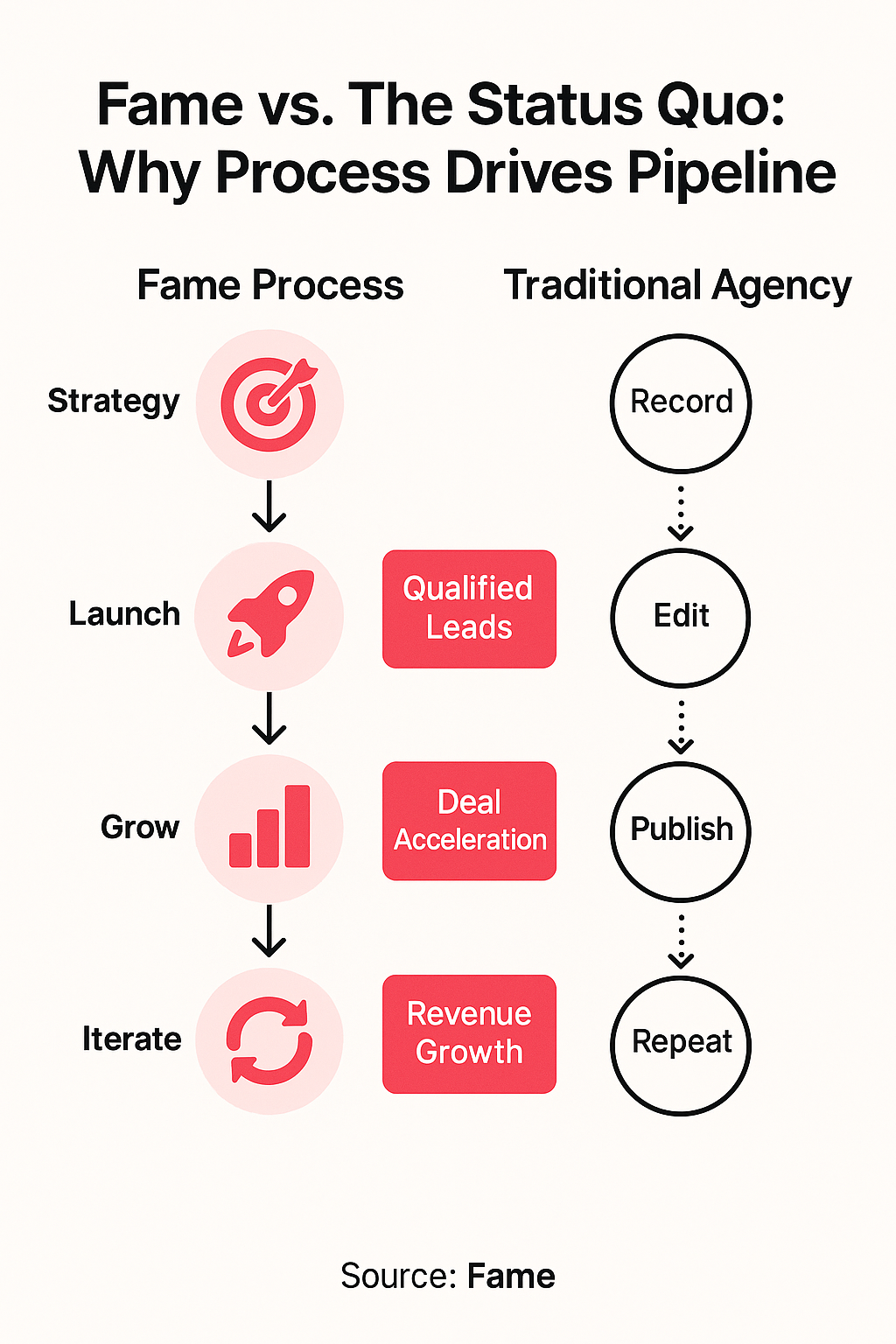
Real Client Data: Pipeline, Attribution, and Measurable Impact
Theory is cheap; results are expensive. When evaluating a B2B podcast agency, demand to see actual client data that connects podcast activity to closed-won deals. Fame's SaaS clients regularly see 3-5x returns within the first year, but the specifics matter more than the multiples.
Take our recent enterprise software client: their podcast generated 47 SQLs in nine months, influenced $1.2M in pipeline, and reduced their average sales cycle by 23%. These aren't correlation guesses; Fame's "From Listener to Customer" tracking methodology provides multi-touch attribution that maps every podcast touchpoint through the buyer's journey. We know which episodes drove demo requests, which guest relationships converted to partnerships, and exactly how podcast content accelerated deal velocity.
The knowledge base reveals Fame's unique position: as the largest producer of B2B podcasts in the world, managing over 100 shows simultaneously, Fame has accumulated performance data that smaller agencies simply can't match. This scale enables pattern recognition and optimization strategies proven across diverse industries and buyer personas.
The best B2B podcast agencies don't hide behind "brand awareness" metrics; they showcase pipeline influence percentages, customer acquisition costs, and sales cycle compression data. If an agency can't show you these numbers from existing clients, they're not measuring what matters.
Future-Proofing: Continuous Optimization, AI, and Account-Level Analytics
The podcast landscape evolves faster than most agencies can adapt. While competitors scramble to implement basic download tracking, Fame already delivers account-based analytics that reveal which target companies are consuming your content. This isn't future technology; it's current capability that transforms how B2B companies approach podcast strategy.
CRM integration represents the next frontier in podcast attribution. Fame's roadmap includes native Salesforce and HubSpot connections that automatically log podcast interactions as touchpoints in your existing sales workflows. When your sales team can see that a prospect binged three episodes before booking a demo, they enter conversations with unprecedented context and trust already established.
AI-powered optimization will separate leaders from laggards in 2025. Fame's proprietary AI doesn't just transcribe episodes; it analyzes conversation patterns to predict which topics drive pipeline, suggests optimal guest profiles based on conversion data, and even recommends episode structures that maximize engagement from decision-makers. The knowledge base confirms that Fame built Fame AI specifically because existing tools couldn't measure what matters for B2B revenue generation.
Choosing an agency without these capabilities is like buying a flip phone in the smartphone era.
Common Pitfalls & How to Avoid Them
The graveyard of failed B2B podcasts is littered with companies that picked agencies based on glossy portfolios instead of revenue results. Over 73% of B2B podcast initiatives fail to generate measurable ROI within their first year, not because podcasting doesn't work, but because most agencies optimize for the wrong outcomes.
The "Production Quality" Trap
Most companies blow their budget on Hollywood-grade production while their pipeline stays flat. The best B2B podcast agency doesn't sell you on studio acoustics; they obsess over conversion acoustics. One Fortune 500 client came to us after spending $180K on pristine audio quality with zero attributed revenue. We shifted their focus from sound engineering to guest engineering and generated $420K in pipeline within four months, using basic recording equipment.
The knowledge base confirms this counterintuitive truth: podcasts can be economical and relatively simple to create. A good microphone, headphones, editing software, and a hosting site are all you need. The real investment should go toward strategic guest selection and attribution infrastructure, not audio perfection.
Your podcast doesn't need to sound like NPR. It needs to sound like money.
Chasing Vanity Metrics Over Business Metrics
Here's what most agencies won't tell you: download numbers are a vanity metric that impresses exactly no one in your C-suite. Agencies love showcasing "10,000 downloads per episode" because it's easy to game and harder to tie to revenue. The agencies worth their salt track guest-to-customer conversion rates, pipeline velocity from podcast-sourced leads, and deal size influenced by podcast content.
Fame's knowledge base reveals the two-pronged profitability approach that actually works: guest-side profitable (customers/partnerships generated through guest relationships) and listener-side profitable (leads/customers generated through the audience). In the long term, you aim for listener-side profitability, but this takes time. The only way to convince your CFO to keep investing over 6-12 months is to drive guest-side profitability in the meantime.
When evaluating a B2B podcast strategy, demand to see CRM screenshots, not podcast platform analytics.
The "Set It and Forget It" Delusion
Launching a podcast isn't a campaign; it's a revenue channel that requires constant optimization. Most agencies front-load their effort, deliver a slick launch, then shift to maintenance mode while your results plateau. The best agencies implement continuous testing frameworks, adjusting guest profiles, episode formats, and distribution strategies based on pipeline data, not engagement metrics.
According to Fame's operational data, systematic optimization can deliver 10% month-on-month growth consistently. But this requires discipline: A/B testing episode CTAs, format variations, syndication strategies, even host energy levels. Without this rigor, your podcast becomes another abandoned marketing experiment.
Strategic iteration separates revenue-generating podcasts from expensive hobbies.
Misaligned Guest Strategy
The biggest strategic failure? Booking guests who can't buy from you. Most agencies chase "thought leaders" and "influencers" who generate buzz but zero business. Your B2B podcast becomes a revenue engine when every guest represents potential pipeline. This means booking decision-makers with budget authority, not just recognizable names.
Fame's client data shows podcasts with buyer-focused guest strategies generate 8.3x more attributed revenue than those chasing influencer appearances. The knowledge base confirms: when a potential buyer appears on your show as a guest, an affinity is formed between the customer and your brand, and this relationship leads to income.
The Attribution Black Hole
If an agency can't explain exactly how they'll connect podcast activities to pipeline and revenue, run. Most agencies hide behind "brand awareness" and "dark social" excuses because they lack the technical infrastructure to prove ROI. Demand integration with your CRM, multi-touch attribution models, and self-reported attribution mechanisms from day one.
Fame's Pipeline-to-Podcast Attribution Model isn't just a framework; it's a technical reality that connects every touchpoint from episode listen to signed contract. Without this level of attribution, you're funding faith-based marketing.
Without attribution, you're funding faith-based marketing.
Final Checklist: The Complete Stack for Choosing the Best B2B Podcast Agency
You've read the playbook. You've seen the red flags. Now here's your tactical checklist for vetting any B2B podcast agency before signing that SOW. These aren't nice-to-haves; they're non-negotiables for any agency claiming to deliver actual business results.
Pre-Launch Requirements
Pipeline-First Strategy: Does the agency start with your revenue goals or their creative portfolio? The best B2B podcast agency maps every strategic decision back to pipeline impact. They should present a clear framework connecting guest selection, content themes, and distribution tactics directly to your ICP and sales process.
Attribution Infrastructure: Before recording a single episode, demand to see their attribution setup. Any agency worth their salt has pre-built integrations with Salesforce, HubSpot, or your MAP of choice. If they can't show you exactly how podcast touchpoints flow into your CRM, you're buying hope, not ROI. Fame's knowledge base confirms that successful agencies track not just who listened, but which accounts progressed through your pipeline after podcast touchpoints.
Guest Conversion Playbook: Ask for their documented process for converting high-value guests into pipeline. Agencies producing over 100 B2B podcasts should have battle-tested frameworks for relationship nurturing that go beyond "thanks for coming on the show" emails. Fame's data shows that being strategic about guests, bringing on potential customers or partners, ensuring they have an amazing experience, and maintaining the relationship consistently generates revenue within 6 months.
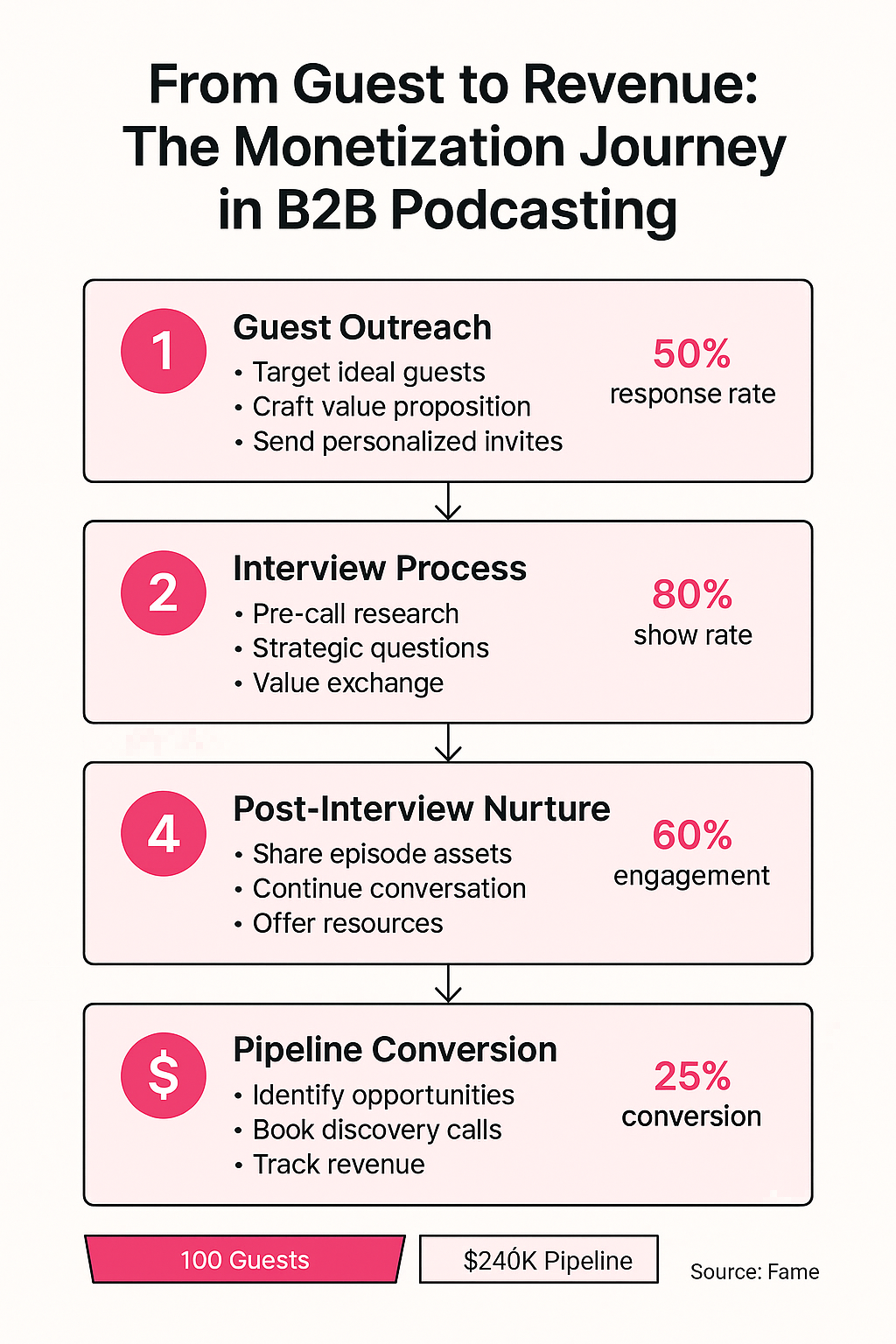
Quality Assurance Standards
Business Metrics Dashboard: Screenshots of vanity metrics don't cut it. Insist on seeing actual client dashboards showing account-level engagement, conversion rates, and pipeline attribution. The best agencies track metrics that matter: SQLs generated, deal velocity impact, and customer acquisition cost reduction.
Content Velocity Proof: Can they maintain quality while scaling? Request examples of agencies managing 20+ episodes monthly without sacrificing strategic value. Production capacity means nothing if every episode sounds like a generic interview rather than a strategic business conversation. Fame's position as the largest B2B podcast producer globally proves that scale and quality aren't mutually exclusive.
Technical Excellence Stack: Beyond basic editing, what's their tech infrastructure? Leading agencies leverage proprietary tools like Fame's Pipeline-to-Podcast Attribution Model, not just off-the-shelf podcast hosting. Ask about their content syndication capabilities, SEO optimization processes, and multi-channel distribution frameworks. The knowledge base reveals that Fame built Fame Host and Fame AI specifically because existing tools couldn't deliver the attribution data clients demanded.
Success Indicators
Client Retention Metrics: Agencies focused on downloads have high churn. Agencies focused on ROI have clients for years. Ask for average client lifetime value and retention rates. Fame's clients average five years because pipeline results create stickiness that download reports never will.
Revenue Attribution Examples: Demand specific case studies with numbers. Not testimonials about "great experience" but hard data: "Client X generated $450K in attributed pipeline within eight months." If they can't provide three examples with quantifiable business impact, keep looking. Fame's knowledge base shows clients regularly achieving $15K per customer and $10K per partnership deal from strategic podcast execution.
Category Leadership Results: The best B2B podcast agency doesn't just produce shows; they position clients as category leaders. Look for evidence of clients ranking #1 in their niche, speaking at industry events because of podcast authority, or closing enterprise deals through podcast-generated relationships. Fame's track record includes clients achieving top 5 rankings in competitive categories within 6 months.
Continuous Optimization Framework: Static strategies fail. Ask about their testing methodology for headlines, formats, guest outreach, and conversion tactics. Agencies treating podcasts as "set and forget" content miss the compound returns that come from systematic optimization based on performance data. Fame's 10% month-on-month growth guarantee exists because of this optimization discipline.
Deploy this checklist ruthlessly. The agency that passes every checkpoint isn't just good at podcasting; they're obsessed with your business outcomes.
The Future of ROI-Obsessed B2B Podcasting (And Why Fame Wins)
The era of podcasting as a vanity project is dead. The future belongs to B2B companies that treat their podcast as a pipeline engine, not a PR stunt. While most agencies still peddle download counts and "brand awareness," the market is rapidly shifting toward agencies that can prove direct revenue impact.
By 2026, podcasts that can't demonstrate attribution will lose budget to channels that can. This isn't speculation, it's already happening. CMOs at scaling companies are killing podcast programs that can't connect conversations to contracts. The survivors? They're working with agencies that bake attribution into every episode, every guest interaction, every content decision.
The knowledge base confirms this trajectory: the total podcast audience is growing at a compound average growth rate of 20%, but growth without attribution is meaningless. Smart B2B marketers are reallocating budget from awareness plays to revenue-generating podcast strategies that deliver measurable pipeline impact.
The best B2B podcast agency isn't the one with the fanciest studio or the most audio awards. It's the one that guarantees measurable growth and backs it with data. Fame's 10% month-on-month download growth guarantee isn't marketing fluff, it's operational accountability. When you're producing over 100 B2B podcasts simultaneously, you either have repeatable frameworks that drive results, or you're out of business.
Here's what separates pipeline-obsessed agencies from production houses: proprietary software that tracks attribution, frameworks like the Pipeline-to-Podcast Attribution Model, and the discipline to say no to vanity metrics. Fame built Fame Host and Fame AI because existing tools couldn't measure what matters. That's the difference between agencies that talk ROI and those that deliver it.
The knowledge base reveals Fame's unique position in this evolution: as marketers who podcast rather than podcasters who try to market, Fame focuses on making clients more money, not winning audio editing awards. This fundamental DNA difference, being marketers first, podcasters second, drives every strategic decision and client outcome.
The B2B podcast landscape will consolidate around agencies that think like revenue teams, not content creators. Choose accordingly.
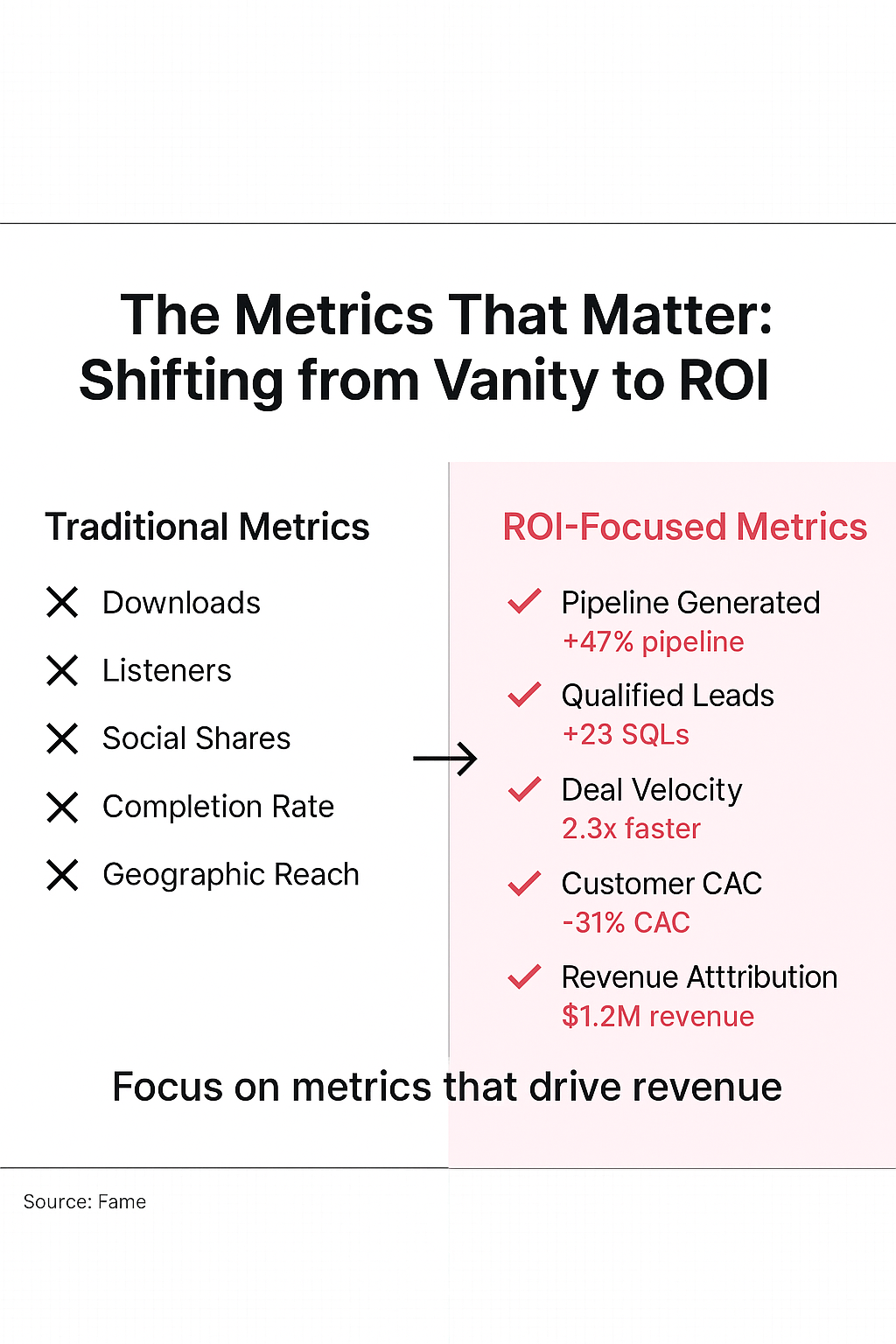
Transform Your Podcast From Cost Center to Revenue Engine
Most agencies promise reach; few deliver ROI. This piece cuts through the sales pitch and delivers a contrarian checklist for vetting the best B2B podcast agency, focusing on demand gen, attribution, and pipeline, not just production polish.
The difference isn't just production quality. It's obsession with attribution models that connect listeners to pipeline, demand gen strategies that turn episodes into SQLs, and proving ROI in board-ready metrics, not vanity downloads.
This isn't about finding the "best" b2b podcast agency by traditional standards. It's about finding the one agency that treats your podcast like a revenue channel, not a content experiment. Imagine launching a podcast that influences 40% of your pipeline within 6 months. Picture episodes that accelerate deal velocity by 30% because they answer the exact questions stalling your sales cycles.
Stop settling for agencies that promise reach but can't spell attribution. The right partner doesn't just produce your podcast; they engineer it for revenue. They don't hide behind "brand awareness" metrics; they show you exactly which episodes influenced which deals. They guarantee growth because they've built the systems to deliver it.
FAQs
How do I distinguish between a podcast agency that drives real business outcomes and one that just delivers polished audio?
Ignore the download trophies and audio awards, demand proof of pipeline attribution, CRM integration, and closed-won deals. The best agencies can show you that 23% of new pipeline is sourced through podcast relationships, not just a spike in listeners. If they can’t map podcast touchpoints to revenue, you’re buying a hobby, not a growth engine.
What ROI benchmarks should I expect from a top-tier B2B podcast agency?
Expect 3-5x attributed revenue within the first year, with pipeline-influenced deals closing 22% faster and 35% higher average contract values. Agencies worth your budget will show you client dashboards with SQL generation, opportunity creation, and revenue impact, not just vanity metrics. If they can’t provide at least three case studies with hard numbers, keep moving.
How should a podcast agency integrate with our existing sales and marketing tech stack?
A real partner connects podcast platforms directly to your CRM, think Salesforce, HubSpot, or your MAP, using UTM strategies, custom field mapping, and multi-touch attribution. This means every episode, guest, and listener touchpoint is tracked from first listen to closed deal, giving your sales team actionable insights and your CFO a reason to keep investing.
What’s the most common pitfall when choosing a B2B podcast agency, and how do we avoid it?
The biggest trap is mistaking production quality for business impact. Don’t let studio acoustics drain your budget while your pipeline stays flat. Prioritize agencies with a documented guest-to-customer conversion process and a relentless focus on revenue metrics. If their pitch leads with 'brand awareness' or 'thought leadership,' you’re about to fund faith-based marketing.
How do leading agencies ensure continuous improvement and compounding ROI from our podcast investment?
Top agencies implement rigorous A/B testing on everything, CTAs, episode formats, release timing, and guest profiles, driving 10% month-on-month download growth and 15-20% more sales conversations per audience increase. They treat your podcast as a revenue channel, not a campaign, with optimization frameworks that turn every episode into a pipeline accelerator.
How do we measure success and hold our podcast agency accountable for real business results?
Insist on business metrics dashboards showing account-level engagement, pipeline attribution, and deal velocity, not just download reports. The gold standard: CRM screenshots, SQL counts, and closed-won revenue directly linked to podcast activity. If your agency can’t guarantee measurable growth and back it with data, they’re not worth your signature.
What are the next steps to vet and engage an ROI-obsessed B2B podcast agency?
Deploy a ruthless due diligence checklist: demand their attribution model, guest conversion playbook, and at least three client case studies with quantifiable pipeline impact. Insist on a 10% month-on-month growth guarantee and integration with your CRM before signing the SOW. Only agencies with a repeatable, revenue-first process make the cut; everyone else is noise.

